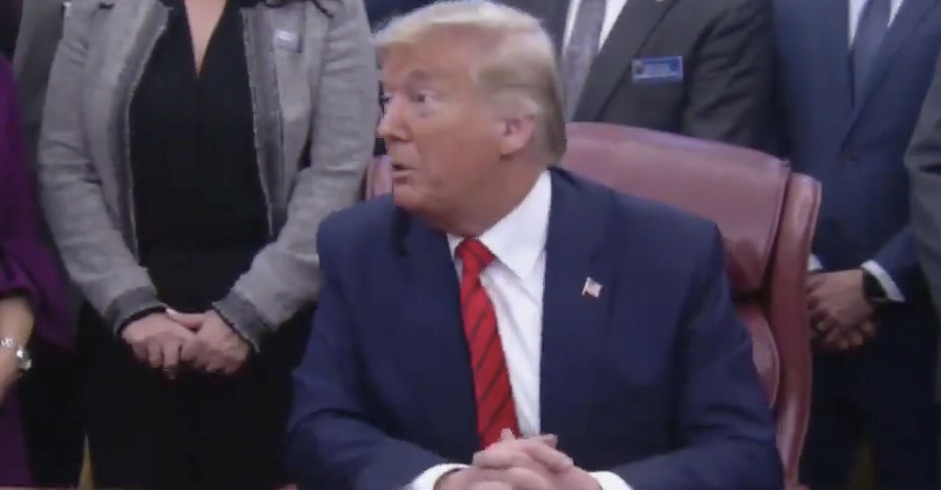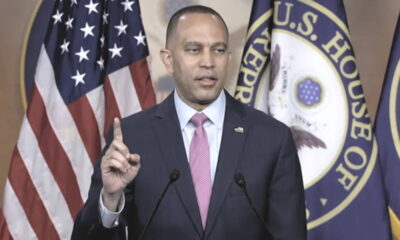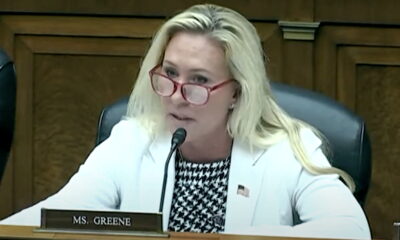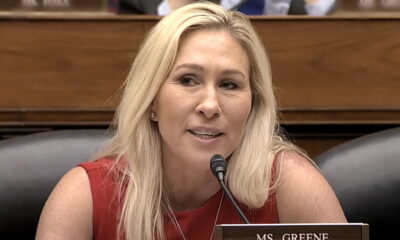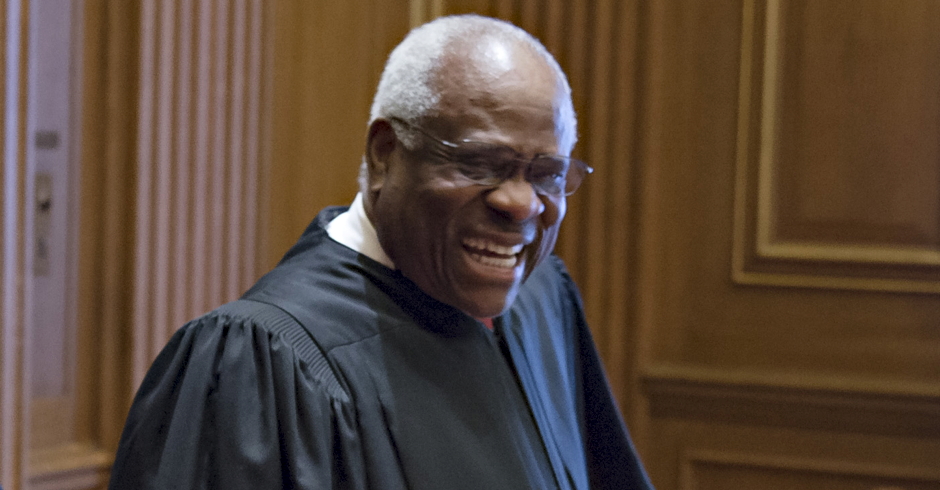U.S. Rep. George Santos (R-NY) after six months of revelations of lies and possible fraudulent activity, surrendered to federal authorities Wednesday morning and is facing 13 criminal charges, from wire fraud to money laundering to lying to Congress and more.
How is it he was allowed to remain a member of Congress for so long, given that many of his lies and many of the allegations of possible fraud and other criminal activity were so well known to the nation, and certainly to the Republican Speaker of the House, Kevin McCarthy, who know possibly earlier than most, possibly as early as the summer of 2021.
Even now, after felony charges have been filed, there will be no effort from the Republican majority House of Representatives, and especially from Speaker McCarthy, to remove Santos from Congress.
Speaker Kevin McCarthy at practically every turn has been protecting Congressman George Santos.
Faced with a minuscule majority, Kevin McCarthy was quick to protect Santos even before the New York Republican representative, now facing federal criminal charges, was sworn into Congress and the California Republican was sworn in as Speaker.
Santos, elected in November of 2022 to represent the people of New York’s 3rd district – the wealthiest in the state and fourth-wealthiest in the nation – was quickly exposed as having lied about nearly his entire background, from his education and work history, to his religion, and apparently even his net worth.
(So expansive is the library of Santos’ lies, New York magazine’s Matt Stieb and Margaret Hartmann have maintained an expansive list, updated Wednesday morning: “Here’s Every Single Lie Told by George Santos.”)
McCarthy, whose goal for years has been to become Speaker of the House, refused to turn against Santos once it became clear that the freshman GOP lawmaker had tremendous power: Republicans have just a five-seat majority, meaning Santos is one of just a few protecting the balance of power, which could move to a Democratic House majority, and a Democratic Speaker of the House, should Santos and just a few other members leave Congress.
READ MORE: While Employed and Running for Congress George Santos Allegedly Received Thousands in Unemployment Benefits: Nassau D.A.
In fact, some, like Washington University in St. Louis Professor Timothy McBride note Santos cast the deciding vote that made McCarthy Speaker – on the fifteenth ballot.
Just days after being elected Speaker, McCarthy made clear he would take no action against Santos, as bombshell after bombshell about Santos’ serial lying exploded at McCarthy’s feet.
“It’s the voters who made that decision, and he has to answer to the voters,” McCarthy said in mid-January, refusing calls to expel him, and just “hours after Nassau County Republican Party Chairman Joseph Cairo Jr. said Santos ‘disgraced the House of Representatives,'” as Bloomberg reported.
That same day, January 11, McCarthy said Santos not only would not be expelled, he would be given committee assignments, because as Speaker he “tries to stick to the Constitution,” despite the Constitution not mentioning committee assignments.
McCarthy used the “Constitution” claim as if that were preventing him from expelling Santos, even though the majority of his constituents and the head of Santos’ local party were demanding his expulsion. (Unlike the Speaker of the House in Tennessee, who orchestrated the expulsion of two Black Democrats in violation of what some legal experts say actually were their First Amendment rights.)
NBC News senior Capitol Hill correspondent Garrett Haake at the time also reported that McCarthy “note[d] that Santos hasn’t been charged with a crime,” implying had he been he might move to expel him.
McCarthy’s protection of Santos continued throughout January.
READ MORE: Bombshell Paper Shows Democrats Likely Won’t Regain Majority Control of Supreme Court Until 2065 – Unless They Expand It
Just one week after ensuring the scandal-laden New York Republican would get committee assignments, McCarthy appeared to casually brush off reports over the past week or more that a Santos campaign aide reportedly had impersonated McCarthy’s chief of staff in fundraising efforts over a period of several years.
“Wealthy donors received calls and emails from a man who said he was Dan Meyer, McCarthy’s chief of staff, during the 2020 and 2022 election cycles, according to people familiar with the matter. His name was actually Sam Miele, and he worked for Santos raising money for his campaign, according to one GOP donor who contributed to Santos’ campaign,” CNBC reported in January.
It’s unclear when and how McCarthy first learned of the possibly unlawful impersonation, and it’s also unknown if or when he reported it to law enforcement authorities.
“You know, I didn’t know about that, it happened. They corrected but I was not notified about that until a later date,” McCarthy claimed to reporters when asked. “I didn’t know about it until a later date though, unfortunately,” he said, repeating himself.
Also in January, before McCarthy claimed he had not known about the impersonation but after reports detailing the deception and that it had been known in McCarthy’s office as early as last August, conservative Bill Kristol observed: “McCarthy seems to have known in 2021 a Santos staffer was impersonating McCarthy’s chief of staff, and he did nothing to inform those who were duped or the public. Nor did he stop Santos from running in 2022. The Santos scandal is also a McCarthy scandal.”
By this point, just halfway into January, McCarthy had taken the posture of not only protecting Santos by refusing to take action against him, he had taken the posture of defending him as if he were Santos’ spokesperson.
On January 17, one day after repeatedly insisting he did not know about a Santos staffer impersonating his chief of staff, Speaker McCarthy became even more involved. Rather than directing reporters’ questions to Santos’ office, he offered remarks that appeared to provide protection to the embattled New York congressman.
CNN’s Manu Raju reported: “Asked if he had concerns before the election about Santos, McCarthy said: ‘My staff had concerns when he had a staff member impersonate my chief of staff and that individual was let go when Mr. Santos found out about it.’”
That not only appeared to possibly conflict with the timeline, but gave Santos direct cover.
Of course, McCarthy had little need to worry about Santos being fully investigated by the Ethics Committee, because after becoming Speaker, in the House Republican majority’s “first official vote, they approved a House rules package that effectively gutted the Office of Congressional Ethics (OCE), the independent body that helps ensure that members of the House don’t abuse their positions,” reported Just Security‘s Gabe Lezra. “It was a striking decision that sent a clear message: the new far-right majority will demand that the other branches of government live up to ethical standards and practices that they themselves have no intention of following.”
By early February it was known that Santos was facing numerous ongoing, pending, or possible investigations, including from the U.S. Dept. of Justice (DOJ), the Federal Election Commission (FEC), the Securities and Exchange Commission (SEC), the Nassau District Attorney, the Queens District Attorney, the New York State Attorney General, and the House Ethics Committee.
READ MORE: George Santos: Drag Queen, Congressman, Yacht Broker – FBI Investigating Role in $19 Million Sale Between Donors
And McCarthy protecting Santos continued into February, when, to the anger and shock of many, the Speaker insisted Rep. Santos – already apparently under multiple state and federal investigations, and even a criminal fraud investigation in Brazil – would be allowed to attend a classified briefing by the Pentagon on threats from China.
Government accountability and national security experts blasted McCarthy’s decision to once again protect Santos – who by that point had already stepped down from the committees McCarthy had allowed him on. One expert, retired U.S. Naval War College professor Tom Nichols, an academic specialist on international affairs including Russia, nuclear weapons, and national security, tweeted in response to McCarthy allowing Santos into a classified briefing: “This is insane.”
One day later, February 9, U.S. Rep. Robert Garcia (D-CA) said McCarthy‘s decision to allow Rep. Santos access to classified intelligence was the “final straw” that moved him and two other freshmen Democratic lawmakers to file a resolution to expel the New York Republican from Congress.
The resolution, HR 114, on Feb. 9 was referred to the House Ethics Committee – which McCarthy and his GOP caucus had gutted. It has sat there, no action taken for the past three months. Not action at all. No action despite, in addition to all the lies Santos has told, some of which he has even admitted, there is one allegation that should have brought an immediate investigation.
The week before the resolution to expel Santos was filed, the week before he was allowed to participate in a classified briefing by the Pentagon, a prospective staffer who says he worked without pay for several days in Santos’ Capitol Hill congressional office, accused him of sexual assault.
Derek Myers filed a formal complaint against Santos, alleging the Congressman invited him to a karaoke club on his second day of work, then “proceeded to take his hand and move it down my leg into my inner-thigh and proceeded to touch my groin.”
Santos denied the allegation, calling it “comical.” One article, last week, claims “George Santos appears to be cleared of charges of sexual harassment,” a claim Myers says is false. There have been no other reports.
On Tuesday, the popular liberal political action committee MeidasTouch posted a video comparing McCarthy’s comments in January about Santos to those earlier that day. They show how McCarthy has shifted positions, from suggesting once criminally charged a member of Congress should be expelled, to saying Santos should be allowed to have a trial before any action is taken.
And now, Wednesday morning, McCarthy dug his heels in even more.
Surrounded by aides, mobbed by reporters, McCarthy extends his protection of Santos even further. The Speaker’s position is now Santos is safe until he is found guilty in a federal trial. And possibly even after.
Santos, McCarthy declares, will “go through his time in trial and we’ll find out how the outcome is.”
McCarthy is now not even committing to expelling Santos if he is found guilty of the criminal charges he is facing.
Watch video from CBS News’ Cristina Corujo below or at this link.
